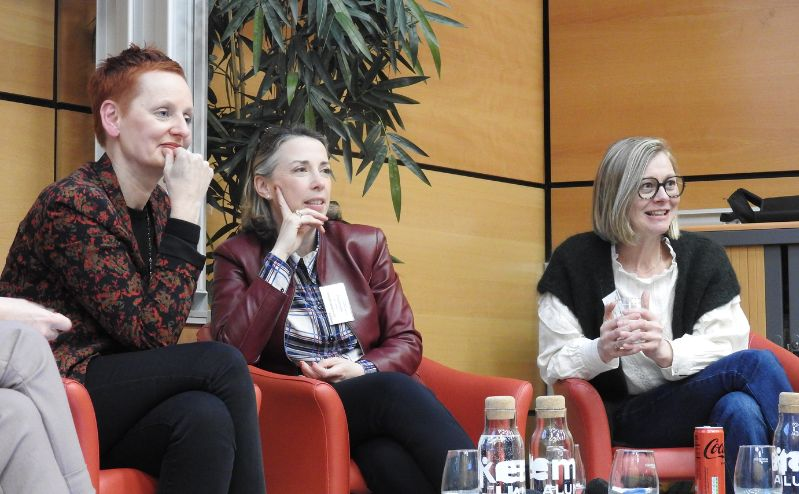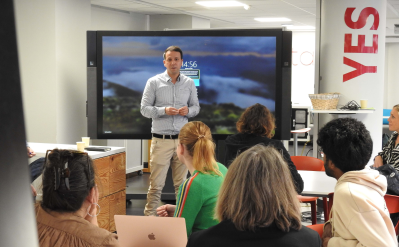News

Diversity and corporate performance: deciphering the issues
"Women's Leadership: How does diversity influence the way companies operate and perform?" This was the extensive and fertile topic of debate at the round table held in Lille on 26 March, organised by SKEMA Alumni in conjunction with the Corporate Department and the Faculty.
A warm thank you to Amélie Debrabandère (SKEMA 1992), Managing Director of Sia Habitat, Claire Gouat-Brunin (SKEMA 1995), Director of Customer and Employee Experience at Société Générale and Fanny Vandenbussche, TALHENCY RH Director, for so helpfully, openly and enthusiastically sharing their experiences! Thanks as well to Sophie Botte for moderating this round table and to Stéphanie Chasserio for her rich and instructive keynote, based on her research and that of Michel Ferrary in the latest Observatoire de la Féminisation des Entreprises.
This round table gave rise to some in-depth reflection on the evolution of mentalities, stereotypes, inclusion and diversity, and the importance of male and female role models.
The current situation
Since the 2011 Copé-Zimmermann Act, we can congratulate France on being the world champion thanks to the number of women represented on boards of directors. But, there is still room for improvement in many areas, and it's still too early to claim victory in terms of gender equality. Among CAC 40 companies, there were no female CEOs, only two female chairpersons and three female managing directors last year. Quotas were more or less met with executive committees. The Rixain Act also encourages the latter indicator, with a target of 40% women on executive committees by 2030.
However, it may be interesting to analyse this from the point of view of corporate development. These objectives are only of value if company managements attach importance to the development of women within their structures. Studies carried out by Michel Ferrary, professor at SKEMA Business School, for example, show where the "glass ceilings" are in companies, and which of the most powerful in the market have a significant number of female executives who never manage to get anywhere near any executive committees in their careers, unlike their male counterparts.
And what about men, in fact? Inclusion seems necessary to counter the conservative, masculine-oriented discourse that betrays a sense that their status is endangered. It is also vital to open up the debate and focus on the real needs of women and the real issues of diversity within the company. Gender stereotypes are still very much alive, and in some neighbouring countries, the subject seems to gained even less ground than in France.
To take things a step further, Stéphanie Chasserio, Professor of Management and Director of the Globalisation Academy, suggested a closer look at Susan Faludi's Blacklash.
Overcoming the impostor syndrome
Claire Gouat-Brunin continued the discussion with our speakers, introducing the concrete case of her business sector and her organisation, Société Générale. She criticised the still reductive discourse and still low figures in terms of inclusion, but noted a willingness to do better and the rollout of concrete actions designed to change the situation. To improve the indicators, women need to overcome the imposter syndrome induced by our society, and assert themselves as women by establishing their real skills and expertise.
SIA HABITAT achieved a remarkable result in the gender equality index, but Amélie Debrabandère stressed that this is by no means a victory in this area, as it only reflects the state of the company's pay policy. But it is still an encouraging example for many other companies where there is plenty of room for improvement in this area.
Amélie reminded us that the work-life balance is a factor closely linked to inclusion, that men still seem somewhat cautious at the idea of taking paternity leave, and that women are not always the first to step forward and seize an opportunity to move up the career ladder.
Fanny Le Gal, for her part, observed greater globalisation and communication around women's leadership in her business. Even so, she deplored the absence of female applicants at a certain level of the hierarchy.
Moving the lines
The key to tomorrow's leadership lies in preserving the authenticity that enables women to provide added value. For until a few years ago, women executives were no doubt unwillingly reproducing many masculine codes in a management style that did not always reflect their personalities.
One of the persistent stumbling blocks for women today seems to be finding the courage to allow and convince themselves to measure up to the job. But isn't the idea of "measuring up" so subjective and codified as to be a cause of self-sabotage? The "good student" syndrome (always obeying the rules and seeking approval) that dogs most women doesn't spare even the most unlikely of them - Angela Merkel or Christine Lagarde, for instance. Amélie confirmed this by admitting that she took the post of Managing Director because it was offered to her, but she would never have applied for it otherwise.
Another area with much room for improvement is pay. Claire reflected on women's responsibility to bring about change in this respect, while stressing the need to avoid a divide that excludes men from this equality. What if women simply dared to negotiate their salaries, to demand pay commensurate with their expertise and expectations? Fanny pointed out that "negotiating your salary is primarily about knowing and having confidence in your value."
Real sexism or lack of knowledge?
It's probably worth bearing in mind that, notwithstanding closed and conservative mindsets, a lack of knowledge is still rife in many people, even women, who have always internalised codes and models. This lack of knowledge sometimes seems to be confused with a prevailing bad faith on the part of men, who have made no move towards deconstructing the hard-and-fast patterns of our society.
In the debate at the end of the round table, one speaker mentioned the idea of more systematically highlighting the soft skills that fatherhood brings to men. This is a considerable asset when it comes to raising their profile in the workplace. The more men take, feel comfortable with and appreciate paternity leave, the more it will serve as a model for others, and make women feel less guilty about taking maternity leave.
Amélie also pointed out the need to work on perceptions and representations. Behaviour and temperament are not interpreted in the same way by men and women. Women are also more likely to be scrutinised and analysed - regarding their dress and attitude, for example.
Maybe the problem isn't exactly where we think it is. We can challenge the gender stereotypes that are still firmly entrenched. The division between pink and blue that still persists today is perhaps insidiously responsible for many inequalities.




